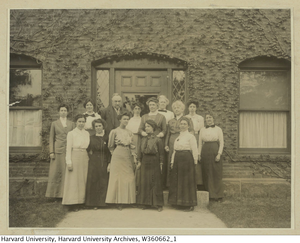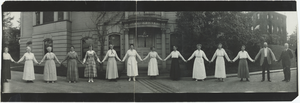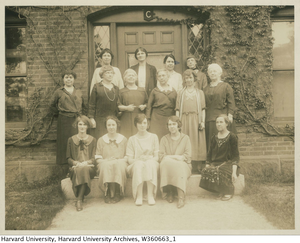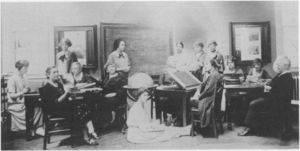
Earliest source: "Observatory Group [photographic group portrait, ca. 1910]." Harvard University Archives / HUPSF Observatory (14). Harvard Libraries, olvwork360662
Harvard calls this photo "Observatory Group", ca. 1910. The Internet often calls it a photo of "Pickering's Harem". I think it's from mid-1911. The lack of Williamina Fleming certainly makes it likely to be after 1911 when she passed away, and Henrietta Leavitt, also absent from the photo, was out of town until late 1911. The photo was taken in the front of the Astrophotographic Library aka, the "Brick Building", aka "Building C."
"Pickering's Harem" may be a modern sexist invention rather than a historic one. I've found no references earlier than 1976 for this phrase. On the other hand, they were much more polite about what the wrote down back then, so it may just as well be a real nickname passed down by oral tradition.
One source that DOES use that nickname, from 1982, also lists a very detailed description of the women in this photo, which I'll just quote here directly:
"At the far left of the photograph is Margaret Harwood (AB Radcliffe 1907, MA University of California 1916), who had just completed her first year as Astronomical Fellow at the Maria Mitchell Observatory. She was later appointed director there, the first woman to be appointed director of an independent observatory. Beside her in the back row is Mollie O'Reilly, a computer from 1906 to 1918. Next to Pickering is Edith Gill, a computer since 1889. Then comes Annie Jump Cannon (BA Wellesley 1884), who at that time was about halfway through classifying stellar spectra for the Henry Draper Catalogue. Behind Miss Cannon is Evelyn Leland, a computer from 1889 to 1925. Next is Florence Cushman, a computer since 1888. Behind Miss Cushman is Marion Whyte, who worked for Miss Cannon as a recorder from 1911 to 1913. At the far right of this row is Grace Brooks, a computer from 1906 to 1920. Ahead of Miss Harwood in the front row is Arville Walker (AB Radcliffe 1906), who served as assistant from 1906 until 1922. From 1922 until 1957 she held the position of secretary to Harlow Shapley, who succeeded Pickering as Director. The next woman may be Johanna Mackie, an assistant from 1903 to 1920. She received a gold medal from the American Association of Variable Star Observers (AAVSO) for discovering the first nova in the constellation of Lyra. In front of Pickering is Alta Carpenter, a computer from 1906 to 1920. Next is Mabel Gill, a computer since 1892. And finally, Ida Woods (BA Wellesley 1893), who joined the corps of women computers just after graduation. In 1920 she received the first AAVSO nova medal; by 1927, she had seven bars on it for her discoveries of novae on photographs of the Milky Way."pickeringsharem

Earliest source: "[Observatory Staff in "paper doll" pose, (in line holding hands) panoramic photograph ca. 1918]." Harvard University Archives / UAV 630.271 (391). Harvard Libraries, olvwork432043
From left to right (primary identifications come from Harvard, who says the names were listed on the back):
I believe the correct names for two of these are "Mary H. Vann" and "Dorothy Block".jaavsoharwood Also, I think this is Mabel, not Edith Gill (or the few other labelled photos I've seen so far similarly mislabel the presumed sisters).
For the longest time I didn't know where pictures like this one were taken. This is an addition to the director's residence added in about 1893 that maybe doubled the size of the residence. The building is not curved, and the brick building to the right is the end of the astrophotographic addition, lying in the same plane. The wide angle just makes it look like a 90 degree bend.

Earliest source: "Observatory Women [photographic group portrait, 1925]." Harvard University Archives / HUPSF Observatory (19). Harvard Libraries, olvwork360663
Harvard says the caption is "As We Were" in the upper left corner, but they must not have scanned that or it is on the back. This is an amazing photo crossing generations of women at Harvard. It's the end of the era of women computers, and the beginning of the era of women scientists.
I found a source identifying the names. Ceclia Payne's expanded autobiography.paynerecollections My guesses were all correct (I skipped five of them).
Back row:
Middle row:
Bottom row:

Earliest source: Margaret W. Rossiter. ""Women's Work" in Science, 1880-1910." Isis vol. 71 no. 3. University of Chicago Press, September 1980.womensworksci
Unknown location. (Actually I now believe this may be the west wing of the original building, in the transit room, but after the transit instruments were removed). Source says this photo was taken 19 May, 1925.pickeringsharem
I've only just now noticed that these women are all wearing the exact same outfits as in the other 1925 photo above "As We Were", and so both photos were probably taken on the same day. They appear to be the same set of women, and based on that I've put in the five names I hadn't figured out.
My guesses on identity, left to right:
H. Wilson, A. Maury, A. Hoovens, I. Woods, A. J. Cannon, M. Howe, M. Harwood (on floor), E. Leland, A. Walker, L. Hodgdon, C. Payne (seated), E. F. Gill (standing), M. Walton Mayall, M. Gill, F. Cushman
 Fine's Home
Fine's Home